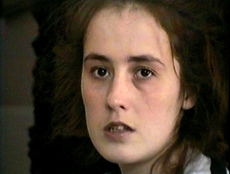 By Sandrine Bonnaire (2007) gives a multi-tiered view of mental differences and how some of those who need special care are treated by the medical system, their peers, family and caregivers. Sabine, is the protagonist, a woman who was found to be different from her siblings and in need of particular care at a young age. Sabine is autistic and as a 38 year old large figured adult, she sits on a couch of a special home where her head hangs to the side and her mouth stays open with a drool. She is asked by a caretaker if she would like to see the animals. She answers yes but asks that if she sees the animals will it mean she can't go gardening as well. It's a surprisingly well thought out response given her overall expression. Sabine enters a barn with a caretaker, pets a horse and feeds the animals as instructed. She drools fairly constantly and repeatedly asks to take a break. She is fatigued easily and seems fragile. The scene flips to Sandrine dancing with her sister, many years before. They both look to be in their early twenties. Sabine gazes at the camera, with one eye squinting. She can dance, read and write. She's also barely recognizable as a very thin, pretty girl in a patterned sweater awkwardly and adorably dancing with her father and sister. She was enrolled at school with her siblings, but the tormenting by her peers caused her to self mutilate and within three months she was out of school. She stayed at home with her mother until she was twenty seven. During those years with her family she was both creative and productive. She would make dolls, knit sweaters for the whole family, study English and Geography in her room for hours with books she bought with her own allowance money. Sandrine bought her a piano and with private instruction she was quickly playing advanced compositions by Schubert and Bach. She even composed her own piece, The Path of France The scenes change to Sabine in the garden and not so much gardening as lying down with her back on the grass and her eyes closed, her arms to the side and her legs straight out in front of her. Sabine does not want to move and once propped up by a good natured caretaker lies down again. She seems genuinely exhausted and all her movements are exceedingly sluggish. Somehow she makes it into the house as they are having lunch as a group. Sabine after a couple of forkfuls of food lets out a high pitched screech, twice. She wants to eat with Sandrine but can't as the latter is filming. The difference in Sabine's appearance came after her stay in a hospital when she began to spit and hit her mother. She gained sixty pounds in a few years, began to drool and despite large quantities of oral medication she still hits and spits at times. Sandrine expresses shock at the difference the stay in the hospital had on Sabine. The filmmaker also, by way of theme, questions the efficacy of the medications on the patients. Does it really help them lead more fulfilled lives or does it just make them more ill by depleting the natural intelligence and slowing down the patient? Would Sabine have become worse on her own, with or without medicines? These are questions that are left to the viewer to ponder, as there seems no perfect answer but the feeling that there must be a better way. It also makes one wonder, what of the patients whose families cannot afford such high end care as those in the film receive? Her name is Sabine connotes more from French as "Call Her Sabine." She is a person, a sibling and a friend. By Sarah Bahl 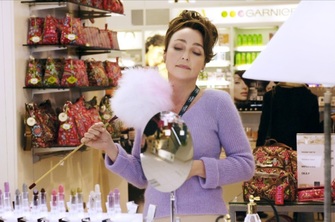 Is a Cinderella story that goes both ways, for what happens when Prince Charming needs to be rescued himself before he can save his Princess? The tale begins to calypso music and in a Belgium shopping mall where a woman wearing dark sunglasses and an expensive black coat with fur trim fingers through the makeup counter with a unique sense of urgency. Odette, (played by Catherine Frot) an especially pretty middle aged sales associate with auburn hair reveals herself from behind a set of mirrors and asks what she can do to help. The lady removes her glasses to show a bruised eye and says she has a rash. Odette replies; "No problem, I have the right cover for you." And when she attempts to apply it to the lady's bruise, the woman winces and draws away. Odette advises her to get a steak from one floor down to draw out the pain and swelling. The woman insists she wasn't beaten but walked into a door and Odette's response is; "Yeah, sure, I myself walked into many a door when I was in love." The lady walks off with the cover stick and Odette leaps up the escalator steps because "It's time!" Her friend, who wears makeup and works in the books department asks her if today is one of special event, and Odette passes by without saying anything. She changes into a pretty, pink and beige suit (she has lovely clothes - that seem made beyond the working class, but it is a movie and a French one at that). Odette, with her hair done with light brown feathers, stops by the salon where her son is a hairdresser and asks him what he thinks of her countenance. He responds that she's dressed perfectly for a wedding as the mother in law. She starts to feel bad and as she sits down begins to give excuses for why she should just skip the book signing of her favorite author, Balthazar Balsan, whom she has a deep crush on. Her son insists she goes and takes off the feathered piece which does improve the look dramatically somehow. Once Odette is on the bus sans wedding hair thanks to her son, she asks the women, an elderly lady with incredibly pale, clear skin, next to her if this is the bus for Brussels. The lady asks her, "What?" And Odette says, "No, nevermind." The lady asks "What?" again and Odette eventually asks her if this is the bus to Brussels, while she is basically shouting into the woman's bad ear. "Yes, of course this is the bus to Brussels as it is marked so all over. Why? Am I on the wrong bus again?" A moment that is as gently realistic as it is awkwardly comedic. Odette makes it to the book signing but when she meets Balsan, in an hysterical display of social anxiety, she nearly hits her beloved author in the face with her copy. He signs, but as he is asking her for her name, she blurts out, "Dette," and so he signs her book as such. Our heroine is in tears at a cafe over the signing fiasco and there is nare a stranger to comfort her as what can anyone say? But while on the way back on the bus, Odette reads her novel and her embarrassment is forgotten as she floats in the air, rescued by her love for Balsan's words. On her way home while still reading her novel she sees a man dressed early 90s style with long stringy hair and a plaid long sleeved shirt. He has a beard and is sweeping the porch outside of Odette's apartment building. "Ca va Jesus?" she asks. "Ca va," he responds while taking a drag from a cigarette and looking very drugged up. The Jesus character is weaved throughout a film that could do without him. Perhaps his addition is an attempt to add a deeper motive to a romantic comedy, but it would be better without the symbolism of life, death and eternal powers. Some things are best when they are kept to what they are. Odette returns from the signing to her world, where Josephine Baker's songs and Balsan's words are a godsend within her cramped apartment where she lives with her son and daughter, as well as the latter's boyfriend, whose feet stink and who never brings home a penny after tinkering with cars all day. Her favorite moments are of fantasies. Balsan's life with a stunning wife who has a high end education and who looks out of his league, and their open marriage could not be of greater contrast to the adorable world of Odette. When Balsan's world falls apart, as complications from his and his spouse's affairs reach his professional life, he needs someone to understand and appreciate his work. He needs to be saved by a person separate from his current existence. And in this someone he finds Odette. By Sarah Bahl Begins with the sound of 19th century British royal guard calling out the Royal Salute while in formation. The long line of men in red jackets and tall black hats buckled in gold under the chin; all carrying guns evokes a sense of authority, power, protection and mystery, all in one as the scene fades to a blur and then clears again to a young Queen Victoria, in a red thick velvet cape with black and white fur-like trimming, who is with her beloved King Charles Spaniel, and her lady in waiting. Emily Blunt begins the voice over, "Some people are born more fortunate than others," and so ensues a look into the life and lifestyle of the eventually to be Queen Victoria, who was ruled as a young child by the Kensington System, whereby she was disallowed to do anything on her own and even had to walk down the stairs while holding the hand of an adult at all times. She tells that every little girl wants to be her own princess, even the princess herself.
This system of rules, created and run in junction by Victoria's mother and her lover by insinuation, Sir John Conroy, seems to cover a two fold purpose: one that since Victoria is the only child with claim to the English throne, she has to be duly protected in all possible ways and therefore lives without peer. The second reason being that disallowing the future Queen any sense of autonomy will break her down into signing a regency agreement giving her German born mother control with Sir John controlling her mother. There is a fluid variation in time sequence and it is now June 28, 1838. Queen Victoria is coronated as her feet cannot touch the ground, (her real life height was slightly under five foot tall). The time goes back to when Victoria is an ill teenager, refusing to bow to Sir John's pressure that she sign the regency order. The glow of a fire gives a warm orange-yellow illumination upon the ill girl, as she lies in bed, and her seeming captors. Sir John responds to Victoria's refusals to sign the order with violence, by taking the pen and forcing it into her hand. "I say you will," says he. The pen is thrown on the ground by her. "I say I won't," says she. This scene is thankfully interrupted by Victoria's lady in waiting who has come to give the princess her medicine. At King Leopold's (who is the brother of Victoria's mother) palace in Belgium the politics of Victoria's stance are discussed between Leopold I and an advisor. It is Leopold who insists quite strongly of the marriage of Victoria to her first cousin, Albert of Germany. He is uncle to both of them. Victoria continues to hold the hand of her lady in waiting as she walks down the stairs, skipping the last couple with childlike spirit. Meanwhile Albert is drilled by his advisor as to what novels the princess likes, what she is and is not allowed to do, as well as the types of her various recreations. It is strongly in Leopold's interest for Albert to marry Victoria, as this would solidify alliances among Europe's nobility to his favor. The film talks about Leopold's "survival" being based on having increased access to British resources, yet none of the characters in the film act as if they have survived a day in their lives, though they all have their own battles and sorrows. Albert and his brother visit Victoria where she is staying in a palace belonging to the King of England. Albert attempts a sales pitch upon initially meeting the princess by claiming to have read Sir Walter Scott. The visit awkwardly continues as Albert, with his brother and Victoria, with her surrounders; play chess while they are gazed at to see if their relationship is developing. It does, as the turning point is when Victoria asks Albert, "Do you ever feel like a chess piece yourself in a game being played against your will?" He does not say he does but asks her if that is how she feels. She replies, "Constantly," and that, "I see them leaning in and moving me around the board." "The Duchess and Sir John?" he inquires, coldly referring to her mother as the former. "Not just them," she says, referring to King Leopold and others. Albert tells her, "Then you had better master the rules of the game until you can play it better than they can." She asks him, "You don't recommend I find a husband to play it for me?" "I should find one to play it with you, not for you." Their friendship progresses and continues after the King has died and the new Queen is on the throne. The film implies Victoria is more spirit than strategy at times in ruling her Kingdom and that some members of parliament did not react well to a little woman on the throne with female advisors which lead to general confusion as to outsourcing decisions in order to help the populace of England at large. By accounts the Queen proposed to Albert and their marriage despite ups and downs and squabbles related to the authority as well as the ruling of the Kingdom, was a uniquely happy one. When Albert died at the age of 42, from illness, Victoria spent the rest of her life in mourning. They had nine children together whose descendants live throughout the world. By Sarah Bahl This 2010 French film starring Catherine Deneuve, Gerard Depardieu, Fabrice Luchini, Karin Viard, Judith Godreche and Jeremie Renier; begins with a cheesy 1970s jingle as Suzanne Pujol (Deneuve) jogs in the morning light by beautiful lakeside scenery with her hair in curlers and covered with a net. Suzanne is the spoiled and self defacing housewife of industrialist, Robert Pujol who owns an umbrella factory he received through her dowry. The movie is first set on Suzanne's birthday which is like any other day for her as she goes for her morning jog in her bright red 70s running suit, blows kisses to doves, writes poems about squirrels and nags her husband to take his medicinal drops.
They have breakfast together and Robert, instead of remembering her birthday, reminds his wife her place is not in the kitchen, as she has given the servants the week off. Suzanne wonders out loud to him where her place is. Robert tells her they both must not forget she is Mrs. Pujol, as if she has no thoughts for herself and her thoughts are the same as his. And she says she tells herself everyday, "Je suis Madame Pujol, Je suis Madame Pujol" - yet she doesn't know what her place within that role is. After Robert leaves for work but not before complaining about his workers, Suzanne realizes he forgot his drops and she calls the Pujol- Michonneu factory to have her husband's office wife, Nadege who is the company's top secretary, make sure he takes them. Their brief talk is hilariously awkward. Nadege is upset to find via Suzanne that Robert has been to Badaboum with a so called German buyer and she tells him to get it from his whores at the club. He whines that the place is closed on Thursdays. Joelle, the Pujol's grown daughter, comes to visit Suzanne who is making a bed and fluffing pillows. In honor of Suzanne's birthday Joelle picks a rose from her parents' garden and gives it to her mother. Joelle shares news with Suzanne, who is shocked and saddened to hear Joelle might be divorcing; as her husband, Jean-Charles is always traveling, is not spending time with their boys, and Joelle is afraid he is having affairs. Suzanne encourages her daughter to stay with her husband as sparks may fly again, Joelle's response is, or not, as she cruelly points out Suzanne and Robert sleep in separate bedrooms. Suzanne says sex is not everything and Joelle says, at her age perhaps! Joelle tells her mother, she does not want to be like her; an overly accepting potiche (pretty vase on a shelf). Joelle continues that she thinks her mother is a doormat and women don't have to put up with men's whims in such a manner anymore, it is the late 1970s after all. Robert arrives home to take his drops as he was too busy at Badaboum the night before to take them. His daughter reminds him of his wife's birthday and he is surprised, says he is busy and tells Suzanne to buy whatever she likes. She meekly thanks him. After Joelle leaves, Robert takes his drops but spits them up when his wife says their son, Laurent, is considering marrying Floriane Marquiset. Robert shouts that Floriane is no better than a prostitute, and Suzanne calmly replies that he is being a snob, he doesn't even know Floriane, that her father owns a patisserie and Floriane is accomplished and highly proficient at the piano. Robert does not care about any of this and says Suzanne has no right to an opinion. That she is a spoiled little woman who should be happy with kitchen appliances. Then the phone rings and it is someone to inform Robert all of his workers have gone on strike. He leaves after pondering out loud the cost of the strike to himself and an announcement that he will show all the workers his fists. Suzanne contemplates the strike and then writes a poem about a rose. Suzanne's relationship with Laurent is much more relaxed. She encourages him to study art as he doesn't like political science. He is gentle and conversational. She asks him to tell her about Floriane and then mentions while peeling a carrot how it is too bad Mrs. Marquiset died by electrocution from a hairdryer. Later that evening the family is gathered together, Joelle with her two boys, Suzanne and Laurent, as the adults smoke, eat well coiffed appetizers and drink bubbly alcohol. Robert is not there as Suzanne comments that her husband's whereabouts have become more and more mysterious. The doorbell rings and everyone assumes it is Robert, "J'arrive Papa, J'arrive," says Joelle as she dashes to the door with a cigarette held between her manicured fingers. "Nadege, what are you here for?" Nadege tells her it is urgent and Joelle gestures to an absolutely gorgeous and cultured looking family room. Nadege tells them that yes, it involves Robert and that he has been taken hostage by the workers. Laurent leaves to settle the dispute in a humane manner, but comes back disheveled and with torn clothes as his father attacked him along with giving his son some words of choice. The family is unsure of what to do next, but Suzanne decides to go to the city's mayor, who happens to be her old lover and ask him to intervene in order to quell the worker's rage so her husband may be released. Maurice Babin, otherwise known as Monsieur Deputy Mayor is a man of the people and is in complete contrast to the Pujol's and their lifestyle. Suzanne is also the one who blew him off after their affair and she was married to Robert at the time, but she plays her cards right, Maurice forgives all of this and agrees to intervene. The next morning Robert is at home in bed, with a doctor giving him orders to come to the hospital for tests as he is run down from daily work. Nadege is also still there having breakfast with Joelle and Laurent. She suggests she make a bullion for Robert and Joelle just looks stunned as Laurent politely and awkwardly says, pourquoi pas?; then Nadege dashes about to make her healing broth as if she has been waiting to do so her whole life. Suzanne also, at her husband's request takes over the factory. Robert is too ill and high strung to continue with the work, especially considering the dour climate of the working landscape. She does an excellent job and the employees really like her. Both her son and daughter also serve at the factory under their mother's leadership and it becomes a successful family operation. Though, when Robert comes back from a refreshing cruise in better color and overall health, he wants to take the factory back from Suzanne. He lets her know this at the Pujol-Michonneau home office, after he gives her a lovely gold bracelet in the presence of Nadege. He gives the secretary a present too, of Turkish candies that can be bought at any given international airport. The same as giving one's lover the gift of a wrapped Toblerone in front of one's spouse. Suzanne puts up a fight for control over the factory. She tells her husband he can now be like a lion on a plain, doing nothing all day, but golf and fish. Suzanne does not win her battle for the factory, due to internal family politics, but she does even better for herself in the end, as all the politics Suzanne has up her sleeve come into full force. With Potiche the main perspective of satire is based on how unpure yet sociable humanity really is. Perhaps it is best not to generalize but it seems that in American films, affairs are heartbreaking and treated as scandalous. In French cinema, the affair itself, is not of consideration as much as how far the film may go in originality to mock such a cliche. It is odd that Joelle, should resemble Maurice Babin in looks. And as the story progresses it becomes increasingly apparent that Suzanne is not so meek and naive as she would seem but is simply a more mature version of Robert. The two understand each other in a way no one else could ever know either of them. They remain together based on this bond alone it seems. By Sarah C. Bahl Is about how the pain of both life and death is made easier to digest in the form of stories. The scene begins at a snow covered funeral where an elderly man gives a eulogy to an imaginary group of mourners.
In 1965 Abel and Junon had Joseph, the first born. They also had a little girl, and when Joseph was in kindergarten he developed Burkitt's Lymphoma. The tragedy is not told directly with the watched brutality of a child's illness but in the form of gentle puppets. Neither the daughter nor the parents were compatible with Joseph. In desperation the couple conceives a third child, Henri, but his placenta was also not a match. Joseph died 18 months after the birth of Henri, to make Elizabeth the eldest of what was to be eventually two brothers. The memory of Joseph fades. Years later, when Junon is elderly, yet no less beautiful, she gathers a tray of tea and sweets together in a homey, upper middle class house. But while carrying the tray she drops it to the ground, and the world blurs. She sinks to the floor. The scene changes to Elizabeth speaking to a specialist about the family problems and her own sense of herself to be cold and empty. Elizabeth is a playwright, and her brother, Henri bought her the theater for her to perform her works and they were successful. But, Henri did not pay for the theater in direct right and was greatly in debt. The family members; Elizabeth, Abel and Henri stand in court and Abel agrees to pay Henri's debt. But Elizabeth says she will pay the full sum as long as Henri is banished. The judge finds the agreement to be as tastelessly cold as it is over personal for a courtroom, but since the debt needs to be paid, Elizabeth's terms are accepted. Though Henri is banished, it is not because Elizabeth's life is perfect. Her only child, a son has schizophrenia, an essentially incurable disease. Junon comes back from her doctor's appointment to tell Abel, between puffs of elegant cigarette, that she has cancer, though it is curable with a bone marrow transplant, but the transplant could cause a reaction whereby the body basically freaks out at the unknown marrow and starts attacking itself. In the end, it is the inutile Henri who is the match for Junon as well as Elizabeth's son. Junon chooses Henri and the family is brought together for a functionally dysfunctional Christmas, with lots of wine, a children's play and a renegade trip to Midnight Mass. By Sarah Bahl |
Archives
June 2017
Categories
All
|
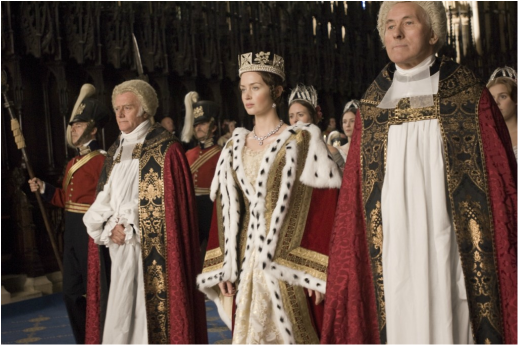
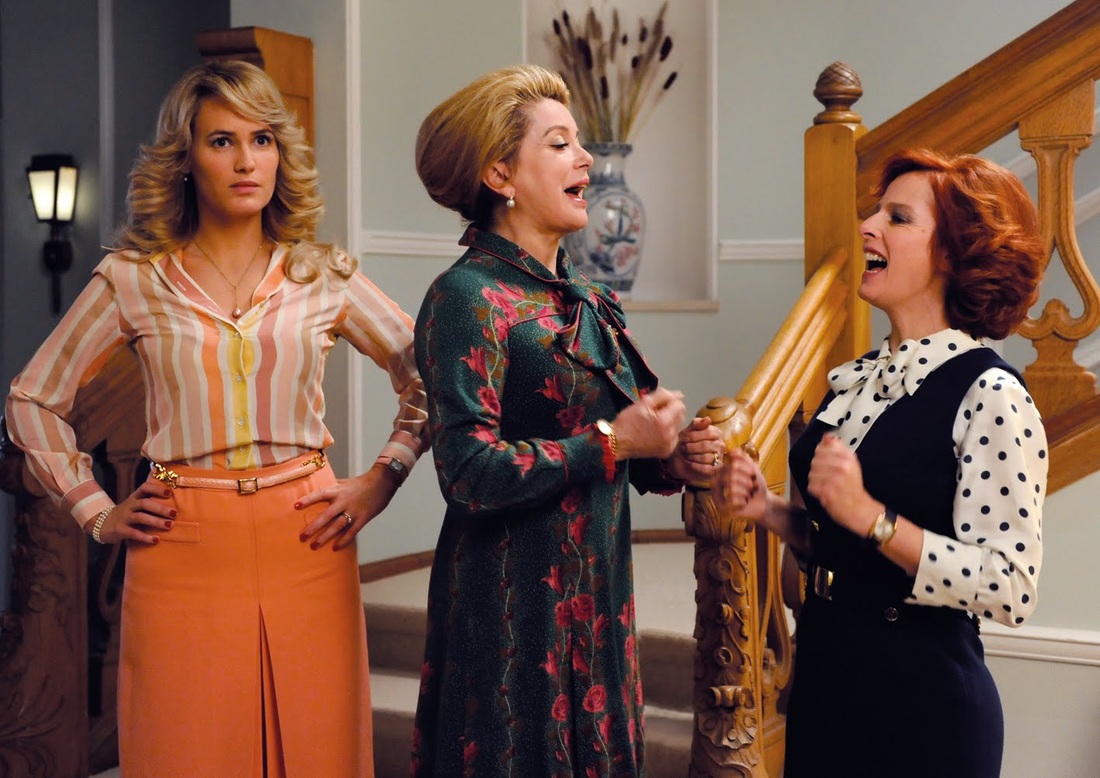
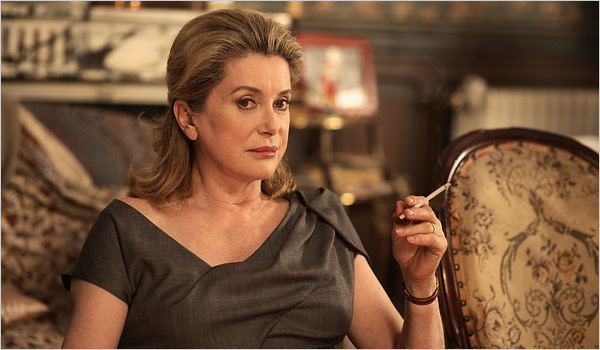
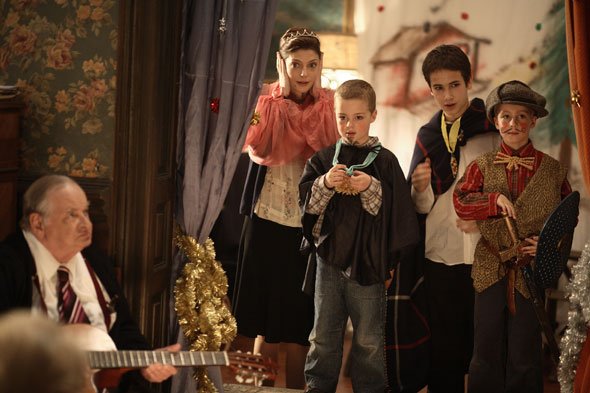
 RSS Feed
RSS Feed